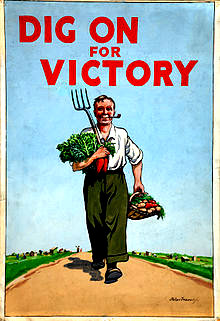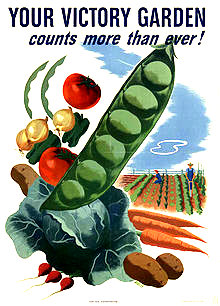I don’t know if I have to explain how shopping for, preparing, and eating food qualifies as fundamental to self-awareness and therefore leadership. A few years ago I would have considered food shopping irrelevant to self-awareness.
I’ve changed.
I’ll start with an aside on how big an effect just gardening can have with Victory Gardens. During the World Wars, when mainstream food production dropped, governments promoted their citizens planting so-called victory gardens — using whatever spare land anyone had, even window-sills, to plant fruits, vegetables, herbs or whatever you could grow. They started them in parks, some continuing as gardens to today.
Here are a couple posters for the project.

and
 Apparently, at their peak, victory gardens produced nearly half the vegetables Americans consumed and the competition scared agribusiness. For those who think agribusiness — maybe Monsanto, ConAgra, and a few peers — could use some competition, this suggests a way.
Apparently, at their peak, victory gardens produced nearly half the vegetables Americans consumed and the competition scared agribusiness. For those who think agribusiness — maybe Monsanto, ConAgra, and a few peers — could use some competition, this suggests a way.
In other words, food is big and important — not just for you in your life, but in all of life, including life, death, war, peace, government, and so on.
Are you active or passive about food?
I could approach food and awareness in many ways. I’ll start by mentioning that food is our most intimate interaction with our environments. Little else literally enters and becomes our bodies. I read (sorry no citation, but should be easy enough to find out online) that humans have more nerve endings in their gut than any place else, implying our bodies react more to food than anything else.
So food seems to follow a main dichotomy of this page between actively creating your life and passively letting it happen. Being active means taking responsibility for your behavior and its consequences, fundamental for leading yourself and others. Being passive means accepting what comes your way, feeling unable to change anything, fundamental for victimhood, nearly the opposite of leadership.
Well, food lets you go either way. You can grow, prepare, and eat your food as actively or passively as you want.
Passive
Processed and junk “food” (as opposed to food) companies want you to accept their “food” passively, not questioning what it contains or what they’ve taken out of it. Their ads tell you how they want you to think about their “food” products — usually wrapped in patriotism (McDonalds and Coca-Cola, for example) or the volume of food per price, like fast “food” places.
I once saw a guy eat a peanut butter cup in under five seconds — probably three — from when he put it toward his mouth to when he had swallowed it, nearly whole. The candy is unhealthy. You’d think he would have at least tried to enjoy its sweetness, but he didn’t. Only, I presume, the pleasure of swallowing.
I call that style of eating passive. He didn’t actively try to sense nuances of flavor, smells, texture, and so on. I don’t know what he got out of eating the candy. I think it made his life overall worse in the long term — not knowing his values I can’t say — for a very small amount of pleasure. He looked very obese. I don’t think he felt he had control over this part of his life — his most intimate interaction with his environment.
Think about it. If your most intimate interaction with your environment is out of control, what does that tell you about the rest of your life? Things where you have less control? How can you lead yourself and others if you can’t manage such basic things?
Every aspect of food that you don’t actively take control of, you accept passively. I suspect this helps set the tone for all your other interactions with your environment.
Active
The alternative to passively accepting food (and “food”) is to interact with it actively. To create it probably gives you the most control — to plant, nurture, and harvest it. Just like you can passively accept what others tell you to value in food (crunchiness, sweetness, novelty, etc) and lose control, you can just as well actively choose any role you like also.
Farmers who produce fruits and vegetables that go straight to you unprocessed — oranges, apples, broccoli, garlic, etc. — assume you know how to use it. They don’t tell you it’s supposed to make you smile or that it’s the latest. I think they barely advertise at all. You have to take responsibility to know how to use it. I think that helps you grow.
One of the great things about food is that you control how you interact with it. You can eat it actively, fast, slow, sensing nuances, involving friends, family, and other community. You can duplicate some important element of most experiments in developing self-awareness and your ability to lead yourself. Since food doesn’t have the intelligence or emotions of most people, interacting with it is much simpler. You can test things there, get them right, then apply them to more complex areas. Some of the main components of leadership and improving your life — listening, perceiving others, managing groups, motivating yourself and others, etc — have direct counterparts in interacting with food.
So do the main counterparts in passivity — learning helplessness, complacency, reactivity, etc.
Examples to come
I’m sure people can become great leaders and live great lives while out of control with respect to the food they eat, but it seems more likely that one part of their lives would hold them back. On the other hand, taking control of that part of their life — requiring using only their minds, what they want to hone for leadership anyway — can lead to great growth in plenty of other areas.
I’ll write tomorrow about my favorite example of using food to increase your awareness. The day after I’ll mention the news story that got me thinking about food.
